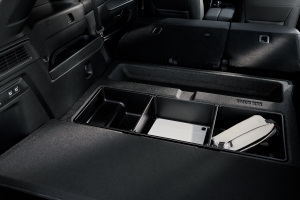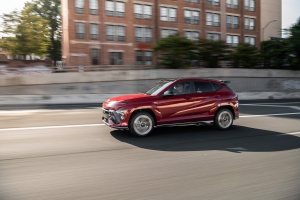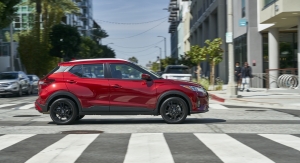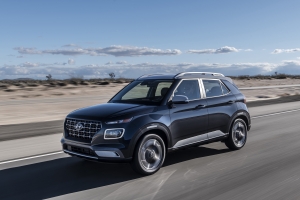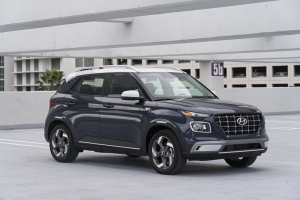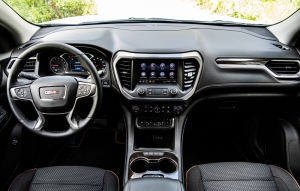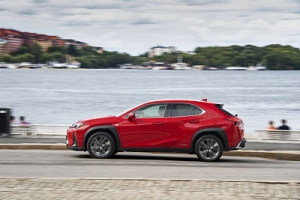2025 Mazda CX-70 PHEV is a fuel-efficient, upscale ride for five
Mazda has a solid lineup of SUV offerings, and there is a new entry to that list for 2025.
The CX-70 joins the fold, falling between the CX-50 and CX-90, and it comes in both regular and PHEV (plug-in hybrid) versions.
Those familiar with the CX-90 will find the CX-70 very familiar, as what Mazda has essentially done here is remove the third row from the CX-90 and rebadge the vehicle as the CX-70. The other update from the CX-90 is that the CX-70 adds under-floor storage in the trunk.
There’s a very specific target audience here — people who like the upscale design and drive quality of the CX-90, but don’t feel they’ll ever have a need to seat people in the third row. For these folks, five roomy and comfortable seats are more than enough, and a capacity for eight passengers is not on their wish list.
I recently tested a 2025 Mazda CX-70 PHEV Premium Plus model, and I’m back with a full report on how this midsize SUV compares in a category with plenty of strong options.
2024 Hyundai Kona delivers attractive redesign, helpful tech
As people continue to flock to smaller SUVs and crossovers, refreshes continue to come to vehicles in this segment to maximize their appeal.
For Hyundai, that means a new version of the 2024 Kona has hit the showrooms, launching the second generation of this subcompact SUV.
I recently spent some time behind the wheel of a 2024 Hyundai Kona N Line, which offers a bold update on a strong competitor in this class that definitely makes it stand out. Upgrades were made inside and out, and the difference is very clear.
It’s one of the better redesigns I have seen in a long time, but it still faces a lot of tough competition in the segment. Read on to see how it competes against other strong mini-ute competitors — including Chevy Trax, Mazda CX-30, Volkswagen Taos, Honda HR-V and more.
2023 Mazda CX-9 offers a high-quality driving experience in a stylish three-row package
Three-row SUVs don’t have to be boring. And the Mazda CX-9 is Exhibit A in this argument.
I recently tested a 2023 Mazda CX-9, which faces a ton of solid competition including the Hyundai Palisade, Kia Telluride and Ford Explorer. But I was pleased to find that the CX-9 holds up very well against all opponents.
Mazda recognizes how popular the midsize crossover has become, and has kept everything from styling to technology up to date so they don’t lose a step.
And at the heart of it all is what makes Mazda tick … that zoom zoom mentality that always keeps in mind the importance of a quality driving experience, even on its larger models like the CX-9.
2022 Nissan Kicks is an affordable, tech-savvy crossover
As large as vehicles have gotten these days, with the biggest SUVs looking more and more like monster trucks than ever, there is still a strong market — particularly among younger people and those who drive mainly in urban areas — for smaller and more maneuverable vehicles that don’t take up so much space.
That’s where vehicles like the 2022 Nissan Kicks — a subcompact crossover first introduced a few years back — come into play. WIth a no-frills approach that’s the polar opposite of the ultra luxury offerings available today, it’s focused mainly on offering an attractive, tech-savvy ride that is also affordable.
I recently tested the 2022 Nissan Kicks (in the top SR trim level), and I’m back with a full report of what it offers and how it compares to the myriad small SUV offerings available to today’s car-buying public.
2021 Hyundai Venue is a nimble, affordable crossover for commuters
Compact, nimble and affordable.
Those are the three words that best describe the 2021 Hyundai Venue, a relatively new subcompact SUV offering (it debuted in 2020) that’s a strong fit for city dwellers and those who don’t want or need a larger vehicle.
I recently spent time in a Venue and I’m back with a full report on how it stacks up to the growing number of mini-SUVs on the market right now.
2021 Toyota Venza reinvented as an upscale, 2-row hybrid
What is the Toyota Venza?
The name may sound familiar, as it was sold from 2009-2015 by Toyota as a wagon-type vehicle based on the Camry platform.
The Venza is back for 2021, but nothing like the original. Instead, Version 2.0 is a two-row crossover that is sold as a hybrid only, and features an attractive and modern design inside and out.
Its competition will be primarily other two-row crossovers that offer hybrids — such as the Ford Escape, Toyota RAV4 and Honda CR-V — a tough battle since many of these models are among the best-sellers annually.
I recently tested a Venza and I’m back with a full report.
LOOKS
With the return of the Venza, Toyota has hit a design home run.
Between its sharp-looking front end, attractive headlight design, smooth side lines, and high-end interior, it debuts high up on the list of two-row crossovers in terms of overall design.
To put the looks of the Venza vs. its leading hybrid crossover competition, it’s without a doubt that the CR-V, RAV4 and Escape hybrids lack the style and design quality you’ll find in the Venza.
You can tell it’s new and different compared to the mainstays in the category, and it has decent cargo space, too. (28.8 cubic feet behind the second row).
The Venza features 19-inch wheels on its top two trim levels (18-inch wheels on the base model), and a hands-free power liftgate.
The interior features SofTex-trimmed seats, heated & ventilated front seats, a heated steering wheel, and an optional panoramic roof. The Star Gaze glass roof is unique in offering both “transparent” and “frosted” modes, with frosted mode reducing direct sunlight.
The design of the Venza has a goal of offering sedan-like driving comfort while also offering crossover versatility, and it achieves that goal for the most part.
HOW’S THE RIDE?
The 2021 Toyota Venza features a 2.5-liter four-cylinder engine and three electric motors, offering a 219 combined horsepower. The latest Toyota Hybrid System can be operated in several modes, including: EV, Eco, Normal and Sport.
It features an electronic continuously variable transmission, and All-Wheel Drive is standard on all trim levels of the Venza, which is nice.
The big question with hybrids is what kind of driving experience they will offer.
As far as the overall driving experience, I found it to be among the better options among hybrids I have tested. Acceleration is enhanced through the hybrid system’s low-speed torque boost and you get moving quickly.
The Sport mode approaches a normal driving experience. But keep your expectations at a realistic level: Don't expect a ton of power in any mode. And Save the EV and Eco modes for situations where you won’t be holding up traffic. Most of the time you can stick to Normal mode and get around in a reasonably enjoyable manner.
For those looking to maximize fuel mileage, a Hybrid System Indicator shows the system output and regeneration status to encourage eco-driving habits by offering a scoring function for the driver.
The Venza is agile and handles well, is responsive to driver input and is extremely quiet inside. Road noise is also kept out, as the Venza is extremely well-insulated.
If you’re more into off-roading, I would recommend opting for the RAV4 hybrid or other crossover options that are better equipped for such excursions than the Venza.
The Venza also features something called Predictive Efficient Drive (PED), which analyzes driving habits to help optimize hybrid battery charging. This system is designed to predict when and where the vehicle is likely to slow down or stop, then uses that information to help reduce energy consumption, and optimize battery charging and discharge ahead of hills or traffic congestion.
TECHNOLOGY, SAFETY
As per usual, Toyota delivers with an impressive array of safety offerings, as well as strong tech features on the Venza.
Starting with safety, the Venza has you covered with a full array of features to keep you safe in the vehicle.
The standard Toyota Safety Sense 2.0 system features a Pre-Collision System with Pedestrian Detection, Full-Speed Range Dynamic Radar Cruise Control, Lane Departure Alert with Steering Assist, Lane Tracing Assist, Automatic High Beams and Road Sign Assist.
For those worst-case scenarios, there are 8 airbags throughout the vehicle to keep you protected during a crash.
The backup camera, including dynamic gridlines, is a big help when backing up and in tight parking situations. There’s even a rear camera washer on the Venza.
Other helpful safety features on the Venza include a Blind Spot Monitor, Front and Rear Parking Assist with automatic braking, and a Bird's Eye View Camera that shows you everything around you.
Also, the Toyota Star Safety System features Vehicle Stability Control, Traction Control, Brake Assist, Anti-lock brakes and more.
Moving on to the technology inside the Venza, I found that the voice commands worked very well, but the touch controls took some time to master. You’ll get there, but the learning curve is a bit longer than you’ll find in other vehicles.
A couple different touchscreen sizes are offered. The LE and XLE editions of the Venza feature an 8-inch touchscreen, while the Limited trim level offers a 12.3-inch touchscreen.
The Venza is in line with the latest technology, compatible with Apple Carplay, Android Auto and Amazon Alexa. It also offers Bluetooth connectivity for streaming of phone calls and music. A 3-month trial of satellite radio is included, as well as a trial subscription to Toyota Remote Services, which allow you to start your vehicle and unlock/lock doors remotely.
Audio options include the standard 6-speaker system; or a JBL Premium Audio System with 9 speakers, including a rear subwoofer, which is powered by a 12-channel, 1,200-watt amp.
Another safety option is the 10-inch color Head-Up Display, which projects vital information at eye level to keep your eyes on the road. This is offered in an Advanced tech package that also includes rain-sensing windshield wipers.
Another very cool option is the digital rearview mirror. If the rear view is blocked by cargo or people in the back seat, simply flip a switch to get an unobstructed view from a rear camera.
MPG
The official fuel mileage numbers on the Venza are 40 city/37 highway/39 combined. I only averaged 31 mpg, but was mainly driving in Sport mode, which will lower your results. More eco-focused driving should keep you close to the listed numbers.
For comparison, the RAV4 hybrid and Ford Escape hybrid both list a combined 40 mpg, while the Honda CR-V hybrid offers a combined 38 mpg.
PRICE
One thing that may keep Venza sales numbers lower than its competition is the pricing. My test vehicle was priced just over $43,000 and the base price starts about $33K. Trim levels include LE, XLE and Limited.
While the vehicle is quite upscale, the numbers may steer potential buyers in another direction. Most other vehicles are easier on the bottom line, and some are also more off-road friendly than the Venza.
As far as warranties, Toyota offers a 36-month/36,000 mile basic new-vehicle warranty, and 60-month/60,000 warranty on the powertrain. Hybrid component repairs are covered for 8 years/100,000 miles. And battery coverage is for 10 years/150,000 miles.
BOTTOM LINE
While the Venza is not likely to become one of Toyota’s best-sellers, it’s yet another strong crossover option that buyers can choose from in a sea full of competition. With attractive and modern looks and design, strong technology and hybrid fuel mileage, there is a lot to like.
I also find it interesting that it comes as a hybrid only, which is another way it distinguishes itself. If you’re looking for a 2-row SUV, particularly one that is a hybrid, it’s worth exploring the Venza with a test drive.
=======
AutoTechReviews.com can be found on Twitter @AutoTechReview, or stay updated at the AutoTechReviews Facebook page.
Matt Myftiu can be found on Twitter @MattMyftiu.
2020 Hyundai Venue looks small, but scores big in debut
Despite a healthy lineup of SUVs already in their arsenal, including the tiny but lauded Hyundai Kona, Hyundai decided that another, even smaller, subcompact was needed.
Aimed at city dwellers who need a compact ride for small parking spaces and strong fuel mileage, but want more than a subcompact sedan, the Hyundai Venue debuted for the 2020 model year.
I recently spent some time driving a 2020 Venue, and here’s a full report on my experience and where this vehicle fits in the growing SUV/crossover landscape.
LOOKS
Measuring several inches shorter than the already diminutive Kona, the Venue is not meant for people who regularly transport passengers who are not small children or tiny adults. It’s also not meant for road trips due to its lack of power and lack of storage space. It’s a commuter car through and through, so my advice is to use the rear seating as a storage area.
The exterior design of the Venue is one of the nicer-looking in the segment, combining the looks of a hatchback with crossover styling.
2020 Nissan Rogue Sport offers superb safety and tech features
With the tremendous success of Nissan’s Rogue crossover, which grew from an upstart to a contender for sales leader in its segment, it was only natural that a new version, the Rogue Sport, was introduced a few years back.
It continues to be a popular offering, and recently I had a chance to drive the 2020 Rogue Sport, which features strong technology and safety offerings, sharp looks, a roomy design and excellent value for the segment.
LOOKS
The Rogue Sport gets some updated, sporty styling for the 2020 model, particularly in the front and rear ends, and the results are pleasing to the eye. LED lights are featured, and you have options for unique metallic paint schemes including Nitro Lime and Monarch Orange.
Though the Rogue Sport is a bit smaller than the standard Rogue, it still offers an impressive amount of cargo space (among best numbers in class, at 61 cubic feet with rear seats down) and decent legroom and headroom both in front and back seats.
2020 GMC Acadia remains a stylish, powerful, tech-savvy crossover
To say there’s a wide variety of midsize crossover SUVs available to today’s car buyers would be the understatement of the year.
And with so many options, even in years without a complete redesign, automakers must step up their offerings to remain competitive in the segment.
Such is the case with the 2020 GMC Acadia, which remains unchanged in many ways, but still offers some bold upgrades in styling, powerplant and technology. I recently spent time in a 2020 Acadia (AT4 trim level) and I’m back with a full report on how it measures up in the segment.
LOOKS
Let’s start with the interior design on the Acadia, which I found to have a very high quality design compared to many of its competitors. Depending on the trim level you choose, quality will vary some, but higher trims are approaching a true luxury level, especially if you opt for the Denali.
In addition to an attractive look and comfort, you also have roominess in the Acadia, especially in the front two rows. Driver and passengers will never feel cramped.
Depending how you equip your Acadia, you can comfortably seat 5, 6 or 7 people in the vehicle. Be aware though that there are some crossovers in the segment that edge out the Acadia in terms of cargo space.
2019 Lexus UX 250h F Sport offers rare combo of luxury, power and fuel mileage
If you want to talk about categories that are exploding in the past few years, subcompact SUVs are probably at the top of the list. On the higher end of things, nearly every luxury automaker has one these days (BMW, Cadillac, Land Rover, Mercedes-Benz, Jaguar, Infiniti, to name a few), so you need to do something to stand out.
Lexus’ entry in this segment is the UX, which stands out in a couple of ways.
First, new for 2019 is a hybrid version of the UX, which is unheard of in this segment.
Also, you can opt for an attractive F Sport package which spices up the exterior and the performance.
I recently spent some time in a 2019 Lexus UX 250h F Sport, which featured both the hybrid engine and the F Sport package, and I’m back with a full report.
News Categories
Popular Tags
Search Reviews by Make

AutoTechReviews is your home for In-depth reviews of the latest cars, trucks, and SUVs; information on all the emerging vehicle technology; and breaking news from the world of NASCAR and other motorsports.
